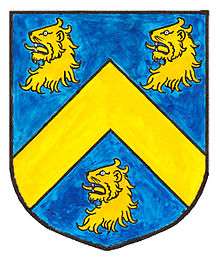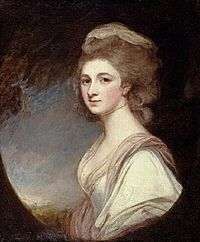George Wyndham, 4th Earl of Egremont


George Francis Wyndham, 4th Earl of Egremont (30 August 1786 – 2 April 1845) of Orchard Wyndham, Somerset and Silverton Park, Devon, was an English nobleman and naval officer.
Origins

He was the son of William Frederick Wyndham (1763–1828), youngest son of Charles Wyndham, 2nd Earl of Egremont (1710–1763) and his wife Frances Mary Harford (born 1759), the illegitimate daughter of Frederick Calvert, 6th Baron Baltimore by Hester Whelan.
Inheritance
His father's elder brother George O'Brien Wyndham, 3rd Earl of Egremont (1751–1837) of Petworth House, Sussex, died without legitimate male issue and so George Francis Wyndham as the heir male succeeded him as Earl of Egremont (and Baron Wyndham and Baron Cockermouth). Perhaps to his surprise, and certainly disappointment, he did not however inherit the great estate and mansion of Petworth (inherited by the 2nd Earl ultimately from the ancient and noble Percy family), which the 3rd Earl bequeathed instead to his natural son Col. George Wyndham, created Baron Leconfield in 1859.
Career
George Francis received his first Royal Navy commission in 1799, rising to captain in 1812.
Buildings
The 4th Earl's principal residence was at Orchard Wyndham, Watchet, in Somerset, the ancient seat of the Wyndham family since the 16th century. He was a prolific builder and early patron of the architect James Thomas Knowles (senior) (1806-1884) and built the following:
- Blackborough House, in the parish of Blackborough, Devon, near Kentisbeare, commenced in 1838 to the design of John Thomas Knowles (senior)[1] but never completed. Italian Renaissance or "Tuscan" in style. It is now semi-derelict and surrounded by a scrap yard.[2]
- All Saints Church, Blackborough, 1838, to the design of John Thomas Knowles (senior).[3]
- Silverton Park in the parish of Silverton, Devon, 1838 to the design of John Thomas Knowles (senior).[4] Neo-classical or "Grecian", unusual in being "entirely clothed in colonnades"(Pevsner). Demolished 1901. It has been suggested[5] that the 4th Earl had commenced the building of Blackbourough House as a secondary seat (from which on occasion he could supervise his Devon estates), with the assumption that Petworth would descend to him at his uncle's death as his principal seat. When that did not occur he determined that Blackborough would not be sufficiently grand as a principal seat and so commenced the building of the more palatial Silverton Park.
- Kentisbeare House, in the parish of Kentisbeare, Devon, built in 1841 as the rectory (for his cousin Rev. Wyndham Scott, appointed by his uncle Hon. Percy Charles Wyndham (1757-1833), 2nd son of 2nd Earl[6]) to the design of John Thomas Knowles (senior).[1]
- Prispen House, Silverton, built in 1839 as the new rectory of Silverton, for which the old rectory was demolished, to the design of Richard Carver. As patron he installed in it as rector his friend Rev. Charles Tripp, the son of Rev. John Tripp (d.1814), rector of Sutton, near Petworth, by his wife Sarah Burchill, said to have been an illegitimate daughter of the 2nd Earl. Charles's brother was Henry Tripp (d.1835), a barrister of the Middle Temple who resided at the Wyndham seat of Orchard Wyndham.[7] Prispen House burnt down in1990.[8]
Marriage
On 14 November 1820 he married Jane Roberts (died 1876), third daughter of Rev. William Roberts, vice-provost of Eton College; but left no surviving issue.[9][10]
Death and succession
He died on 2 April 1845 at Silverton Park, without issue and his titles thus became extinct. Under his will his heir for her life was his widow who died in 1876, and in remainder thereafter to his cousin, William IV Wyndham (1769–1841) of Dinton, Wiltshire, who shared common descent from Sir John Wyndham (1558–1645) of Orchard Wyndham, Somerset.[10] William IV had died in 1841, four years before the Earl's death, but his heir in 1876 became William IV's grandson, William VI Wyndham (1834–1914) of Dinton, who thus inherited the ancient family manor of Orchard Wyndham in Somerset.[10]
References
- 1 2 Pevsner, Nikolaus & Cherry, Bridget, The Buildings of England: Devon, London, 2004, p.515
- ↑ "Buildings at risk for sale - take your pick!". Save Britain's Heritage. Retrieved 3 February 2012.
- ↑ Pevsner, Nikolaus & Cherry, Bridget, The Buildings of England: Devon, London, 2004, p.187
- ↑ Pevsner, Nikolaus & Cherry, Bridget, The Buildings of England: Devon, London, 2004, p.744
- ↑ By Don Shelton
- ↑ Gentleman's Magazine, no 147, p.648
- ↑ Papers of the Tripp family of Shipham, etc., Somerset Archive and Record Service, DD\TP
- ↑ Parnell, Graham J.H. (ed.), Silverton Local History Society, The Book of Silverton, Halsgrove Publishers, Tiverton, 2000, p.71
- ↑ Burke's Genealogical and Heraldic History of the Peerage, Baronetage and Knightage. Burke's Peerage Limited. 1885. p. 1452.
- 1 2 3 Burke's Landed Gentry, 1937, p. 2512, pedigree of Wyndham of Orchard Wyndham
Sources
- George Francis Wyndham, 4th Earl of Egremont at thePeerage.com
| Peerage of Great Britain | ||
|---|---|---|
| Preceded by George Wyndham |
Earl of Egremont 1837–1845 |
Succeeded by Extinct |